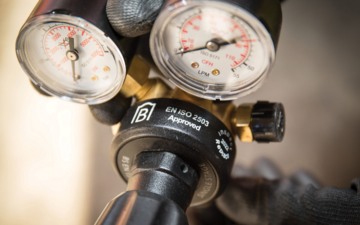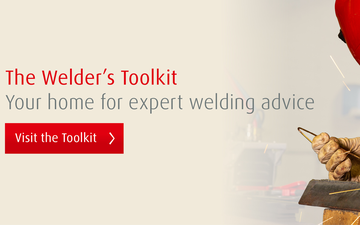- Official BOC UK Online | Industrial Gases | Products & Solutions | BOConline UK
-
Shop
- Industries
- Processes
- Gases & Equipment
-
Solutions
-
Services
-
Health & Safety
-
Contact & Support
- What's Happening
-
Net Zero Strategies
The Efficiency Series: Extending the Life of Your Gas Equipment
Posted by BOC

In The Efficiency Series we’re taking a close look at some of the variables that can impact on the everyday running costs of your welding business.
In our last blog in the Efficiency Series, How to Choose the Right Shielding Gas and Flow Rate, we focused on gases – and how your choice of shielding gases and flow rate can impact on your welding throughput and defects.
This time, we’re looking at your gas equipment. Your regulators, hoses and other items that connect to your cylinders can last for several years if well maintained, but more importantly, careful use and regular inspections can ensure their ongoing safety.
Maintaining your gas equipment
It goes without saying that the quality of your equipment is vital – your regulators, flashback arrestors, hoses and blowpipes should be manufactured to the relevant industry standards and sit well within their expiry dates (speak to your local Gas & Gear team for advice on what to buy).
The area around your cylinder should be kept clear and clean of any debris, and you should ensure that your hoses can’t be damaged by any other equipment or people operating nearby.
You should check for leaks on a regular basis, testing all your connection joints. You can do this by adjusting your regulator to the correct working pressure and using leak detection fluid to spray around the joints. If bubbles appear and you identify a leak, you can turn your cylinder off, ensure your gas hose is purged of pressure, retighten the leaking joint, then open the cylinder valve and re-test.
If a leak persists, your equipment may need closer inspection.
Undertaking regular gas equipment safety checks
If you’re an employer or self-employed, under the Health and Safety at Work Act 1974 it’s your legal responsibility to ensure that equipment on your premises is well maintained and safe to use.
When it comes to your gas equipment, the British Compressed Gases Association (BCGA) Code of Practice recommends an annual safety check.
There are two types of safety check – a CP7 inspection for oxy fuel gases, and CP47 for single cylinder gas.
Both relatively low-cost, a BOC Gas Equipment Safety Check involves a visit to your site by a qualified inspector, who undertakes a visual and functional check of all your gas equipment. They make sure there are no leaks or damage, and that everything is in date and in full working order.
You receive a Report of Thorough Examination if your equipment passes (written evidence that you are following the Health and Safety Executive’s requirements) and a certificate.
If any parts are found to have failed, they can be replaced on the spot – so you can be sure your equipment is safe and ready to use and there’s no downtime.
Is your gas equipment in full working order?
A regular inspection of your gas equipment to ensure that it is safe and in good working order is a low-cost way to protect your staff and your business.
If you would like more detail on CP7 or CP47 inspections or are ready to book an annual safety check, visit our Gas Equipment Safety Inspections page.
Watch our video to find out more about why a safety inspection is so important, and what our inspector will do when they visit your premises.
Please note: cookies must be enabled to view the video. If you do not see the video, please click on ‘Cookie Settings’ and enable Cookies in your browser.

